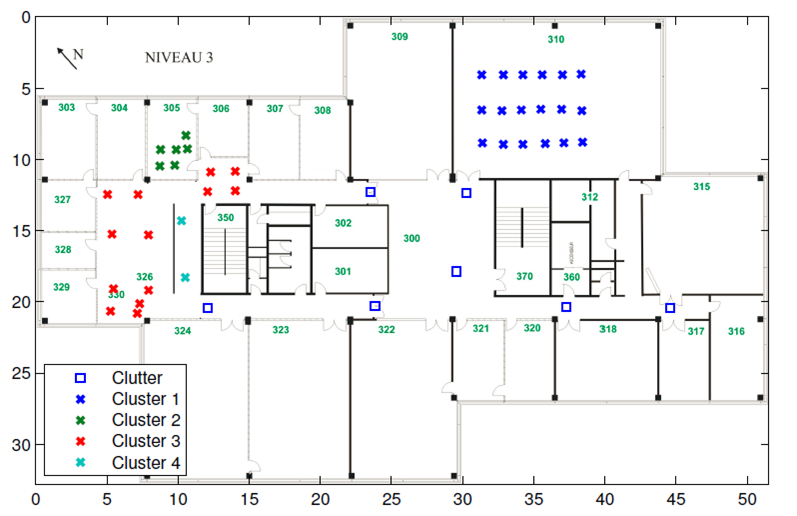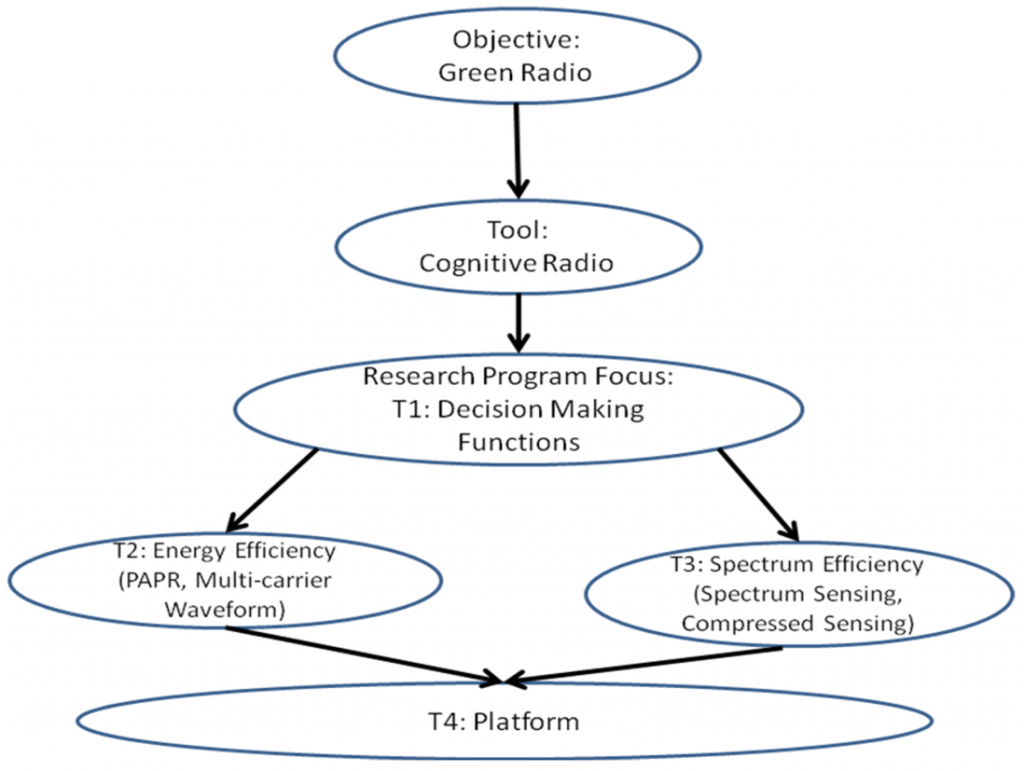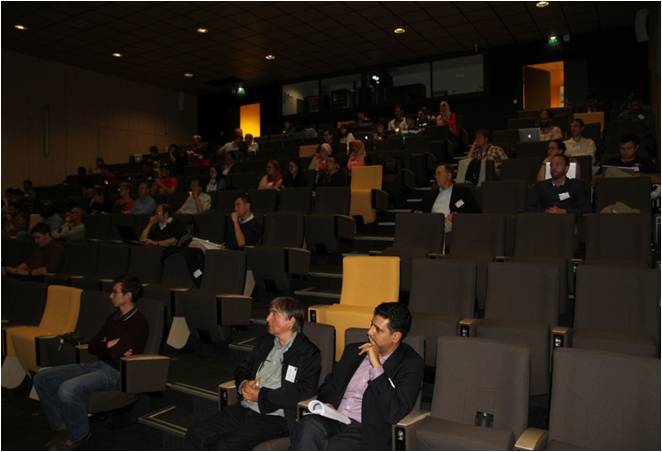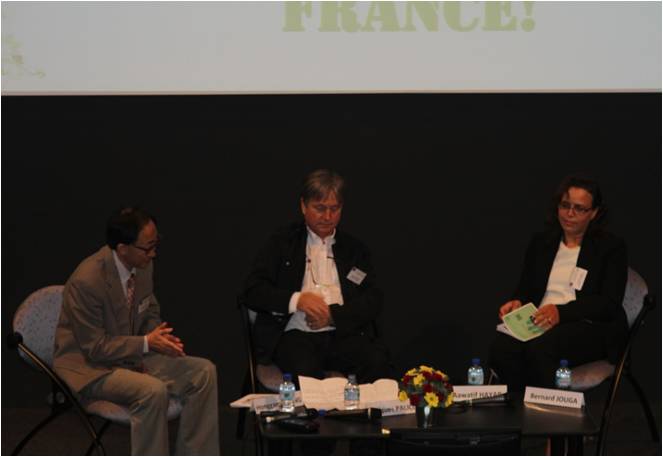UEB/CominLabs & Supélec
Chair (Chair of Excellence) Report
– Summary on the Research Status, Results and Achievements
(Note: Download the Chair Report in PDF)
The following is a summary on the research status, results, and achievements for the whole period of January 2013 to November 2014, as the UEB/CominLabs International Chair Professor (Chair of Excellence) at the Supélec SCEE Lab.
- Research Results, Contributions, and Scientific Achievements in a Nutshell:
Basically, anticipating the challenges of explosive networking traffics increasing (e.g., 1000 times for 5G by the year 2020), it is extremely necessary to decrease the total energy consumption of future communications and networks while improve their energy efficiency for “greener” sustainable development and profitability.
Within the framework of green communications and networks, especially for next-generation green cellular radio access networks including 5G, the GREAT (Green Cognitive Radio for Energy-Aware wireless communication Technologies evolution) project has mainly addressed the fundamental issues of energy efficiency from various perspectives and angles, leveraging on cognitive techniques, at networking level as well as in algorithms approaches, namely:
- Various cognitive green radio techniques have been utilized and verified to improve energy efficiency in different application scenarios. Particularly, representative learning algorithms and decision-making schemes (transfer learning, reinforcement learning, combined learning, UCB, entropy theory, etc.) have been successfully employed for achieving the goal of networks energy saving, under the constraints of base stations power-consumption as well as spectral/capacity requirement.
- In order to improve the balance of energy-efficiency and spectrum-efficiency, the fundamental characteristics of networking traffics have been investigated by taking into account the mobile users’ behavior patterns (mobility, location/position/density, social connection, living style, etc.), in regard to various outdoor as well as indoor networking environments.
- In the scenario of opportunistic spectrum access, the cognitive radio based reciprocal learning algorithm has also been investigated for improving spectrum sharing harmonization.
- Linear-phase VDF design and reconfigurable filter bank mechanisms with complete control over variable subband bandwidths have been proposed for future multiple-standard wireless communication receivers, achieving the improved trade-off of energy-efficiency and spectrum-efficiency.
Finally, energy saving approach realizing “Sleeping Mode” (i.e., base stations & APs switching on-off) has been successfully implemented, based on clustering and clusters detection by applying the indoor location algorithms on the WiFi-based platform, which has been successfully demonstrated at the IEEE Online-GreenComm 2014 (http://www.ieee-onlinegreencomm.org/, a flagship conference of IEEE ComSoc in the area of green communications and networks).
In summary, have been carrying out research on cognitive green communications within the GREAT project, and have finished and submitted 20 high-tier journal papers and 29 international/national conference papers, among which 17 journals papers and 29 conference papers have been published or accepted.
- Research Activities, Results, and Achievements in Concrete
I. Task 1: Decision Making Functions
Task 1 is at the heart of this GREAT research program, and various representative learning and decision making approaches have been investigated, such as reinforcement learning, transfer learning, combined learning, UCB (upper confidence bound) and MDP (Markov decision process), entropy theory, and distributed nodes collaboration. Output of this task has been used by Tasks 2 and 3.
Within Task 1, 5 journal papers/articles have been published or accepted, namely:
- Rongpeng Li, Zhifeng Zhao, Xianfu Chen, Jacques Palicot, and Honggang Zhang, “TACT: A Transfer Actor-Critic Learning Framework for Energy Saving in Cellular Radio Access Networks,” IEEE Trans. on Wireless Communications, April 2014.
- Rongpeng Li, Zhifeng Zhao, Xuan Zhou, Jacques Palicot, and Honggang Zhang, “The Predictability Analysis of Cellular Networks Traffic: From Entropy Theory to Networking Practice,” IEEE Communications Magazine, June 2014.
- Jacques Palicot, Honggang Zhang, and Christophe Moy, “On the Road towards Green Radio,” URSI Radio Science Bulletin, December 2013. (Invited Article)
- Jacques Palicot, Steve McLaughlin, Honggang Zhang, and H. Vincent Poor, “Special Issue on Green Radio,” EURASIP Journal on Wireless Communications & Networking, Feb. 2013. (IEEE Best Readings in Green Communications, Top 100 Highly Accessed Article in EURASIP Journal)
- Xianfu Chen, Jinsong Wu, Yueming Cai, Honggang Zhang, and Tao Chen, “Energy-Efficiency Oriented Traffic Offloading: A Brief Survey for Wireless Networks and A Learning Approach for Heterogeneous Cellular Networks,” IEEE JSAC, 2015.
II. Task 2: Application to Energy Efficiency
This task is fundamental in the program because it is concerned with the power consumption reduction at the signal waveform level. Power consumption reduction and energy efficiency were the core part to deal with green communications requirement. Specially, a number of strategies using the waveform adaptation functionalities of Cognitive Radio to reduce the transmit power consumption have been analyzed, which relied on advanced learning and decision making function under “green” constraint. Accordingly, a series of novel adaptive multicarrier waveforms (e.g. FBMC, OFDM, VDF, etc.) have been put forward, which could make transmitter and receiver running at high efficiency level with low complexity.
Meanwhile, in regard to various outdoor as well as indoor networking environments, the mobile users’ behavior patterns (mobility, location/position/density, social connection, living style, etc.) have been taken into account, in order to improve the balance of energy-efficiency and spectrum-efficiency.
Output of this task has been used by Task 4. Within Task 2, 7 journal papers/articles have been published or accepted, namely:
- Sumit Darak, A. P. Vinod, E. M-K. Lai, Jacques Palicot, and Honggang Zhang, “Linear Phase VDF Design with Unabridged Bandwidth Control over the Nyquist Band,” IEEE Transactions on Circuits and Systems II, June 2014.
- Sumit Darak, Jacques Palicot, Honggang Zhang, A. P. Vinod, and Christophe Moy, “Reconfigurable Filter Bank with Complete Control over Subband Bandwidths for Multistandard Wireless Communication Receivers,” IEEE Transactions on Very Large Scale Integration (VLSI) Systems, September 2014.
- Sumit Darak, Sumedh Dhabu, Christophe Moy, Honggang Zhang, Jacques Palicot, and Vinod Prasad, “Low Complexity and Efficient Dynamic Spectrum Learning and Tunable Bandwidth Access for Heterogeneous Decentralized Cognitive Radio Networks,” Digital Signal Processing (Elsevier), December 2014. (In Press)
- Tao Chen, Honggang Zhang, Xianfu Chen, and Olav Tirkkonen, “SoftMobile: Control Evolution for Future Heterogeneous Mobile Networks,” IEEE Wireles Communications, December 2014.
- Xuan Zhou, Zhifeng Zhao, Rongpeng Li, Yifan Zhou, Tao Chen, Zhisheng Niu, and Honggang Zhang, “Towards 5G: When Explosive Bursts Meet Soft Cloud,” IEEE Network, November 2014.
- Xuan Zhou, Zhifeng Zhao, Rongpeng Li, Yifan Zhou, Jacques Palicot, and Honggang Zhang, “Understanding the Nature of Social Mobile Instant Messaging in Cellular Networks,” IEEE Communications Letters, Feb. 2014. (Top 2 Most Frequently Downloaded Documents in IEEE Communications Letters, Feb. 2014)
- Xuan Zhou, Zhifeng Zhao, Rongpeng Li, Yifan Zhou, Jacques Palicot, and Honggang Zhang, “Human Mobility Patterns in Cellular Networks,” IEEE Communications Letters, October 2013. (Top 11 Most Frequently Downloaded Documents in IEEE Communications Letters, November 2013)
III. Task 3: Application to Spectrum Efficiency
Various efficient strategies for spectrum access and management have been studied in Task 3, in order to increase opportunistic spectrum utilization and reach a good balance of spectrum-efficiency, energy-efficiency and interference. Specifically, new spectrum sensing and accessing methods have been proposed by employing adaptive multi-task compressed sensing and non-stationary Hidden Markov model. Output of this task has been used by Task 4.
Within Task 3, 5 journal papers/articles have been published, namely:
- Xianfu Chen, Honggang Zhang, A. B. MacKenzie, and M. Matinmikko, “Predicting Spectrum Occupancies Using a Non-stationary Hidden Markov Model,” IEEE Wireless Communications Letters, August 2014.
- Xianfu Chen, Honggang Zhang, Marko Hoyhtya, Mika Lasanen, and Jacques Palicot, “Reciprocally Opportunistic Spectrum Access,” European Transactions on Emerging Telecommunications Technologies (ETT), DOI: 10.1002/ett.2810, March 2014.
- Rongpeng Li, Zhifeng Zhao, Yuan Zhang, Jacques Palicot, and Honggang Zhang, “Adaptive Multi-Task Compressive Sensing for Localization in Wireless LANs,” IET Communications, July 2014. (Top 5 Most Frequently Downloaded Documents in IET Communications, September 2014)
- Xin Tao, Zhifeng Zhao, Rongpeng Li, Jacques Palicot, and Honggang Zhang, “Downlink Interference Minimization in Cooperative Cognitive LTE-Femtocell Networks,” EURASIP Journal on Wireless Communications & Networking, July 2013. (Top 100 Highly Accessed Article in EURASIP Journal in 2013)
- Dongheon Lee, Sheng Zhou, Xuan Zhou, Xiaofeng Zhong, Zhisheng Niu, and Honggang Zhang, “Spatial Modeling of the Traffic Density in Cellular Networks,” IEEE Wireless Communications, March 2014.
IV. Task 4: Implementation & Demonstration (Platform)
The aim of Task 4 within the GREAT program was the development, testing, and demonstration of the Green Cognitive Radio concept, algorithms and solutions studied in the Task 2 and Task 3. Within Task 4, parts of the above mentioned algorithms and solutions have been implemented in software simulators as well as in reconfigurable hardware platform (testbed).
In particular, as shown in the following figures, energy saving approach realizing “Sleeping Mode” (i.e., base stations & APs switching on-off) has been successfully implemented, based on clustering and clusters detection by applying the indoor location algorithms on the WiFi-based platform, which has been successfully demonstrated at the IEEE Online-GreenComm 2014.

Energy Saving Approach Realizing Sleeping Mode (AP/BS Switching on-off) Based on Clustering and Clusters Detection by Applying the Indoor Location Algorithm on the WiFi-based Platform.
Other Key Events, Activities and Achievements
The 3rd International Workshop on Next-Generation Green Wireless Networks (Next-GWiN 2014)
- Together with Prof. Jacques Palicot and Supélec SCEE team members, have been planning and organizing the 3rd International Workshop on Next-Generation Green Wireless Networks (Next-GWiN 2014), which has been held at the Supelec in Rennes, October 1-3, 2014.
- Totally, 135 registers from 20 countries around the world. All the feedbacks were very positive and praiseful.
- The European Commission scientific leader, Mr. Pertti Jauhiainen, gave an Opening Keynote on how the European “Horizon 2020” will coin the “landscape” of future ICT innovation and evolution.
- 3 industrial key-leaders from Alcatel-Lucent, Ericsson, and Bell Labs(GreenTouch), Dr. Didier Bourse, Dr. Afif Osseiran, and Dr. Thierry Klein, gave Keynote on how the 5G technologies (5G PPP) and energy challenges will be investigated.
- Up to 17 scientific leaders, Prof. Luis Muñoz, Prof. Hanna Bogucka, Prof. Luiz DaSilva, Prof. Mérouane Debbah, Prof. Eryk Dutkiewicz, Prof. Damien Ernst, Prof. David Grace, Prof. Aawatif Hayar, Mr. Erik Luther, Prof. Michela Meo, Dr. Alain AM Mourad, Dr. Christine Morin, Prof. Loutfi Nuaymi, Dr. Sumei Sun, Prof. Sofie Pollin, Dr. Ahmed Zeddam, and Prof. H. Zhang, gave various invited talks.
- IEEE ComSoc Best Readings on Green Communications: During December 2012 to March 2013, as one of the seven Guest Editors (Prof. Vijay Bhargava, Dr. Jinsong Wu, Prof. John Thompson, Prof. Honggang Zhang, Prof. Ekram Hossain, Prof. Rod Tucker, Dr. Dan Kilper), have been involving in selecting and editing the “IEEE ComSoc Best Readings on Green Communications“, which has been officially announced and opened on the ComSoc website in March 2013.
- Have been involving in organizing the IEEE Online-GreenComm 2014 (2014 IEEE Online Conference on Green Communications) as its TPC Co-Chairs.
- Serving as Series Editors, IEEE Communications Magazine, Green Communications and Computing Networks Series.
- Have assisted Supelec (France) to build up strategic cooperation with Zhejiang University (China): Have built up the long-term strong cooperation between Supélec (France) and Zhejiang University (China). The official MoU (Agreement) for mutual strategic cooperation (scholar and student exchange) has been approved and signed by the General Director of Supelec and the President of Zhejiang University. Prof. Claude Lhermitte and Prof. Pierre Chlique from Supelec have visited the Office of International Relations at the Zhejiang University in June 2013.
- Giving Keynote Speech: Honggang Zhang, “Cognitive Green Communications: A Harmonized Evolution to Sustainable Future”, Conférence de la Recherche de l’UEB, Brest, France, April 2013.
- Giving a plenary talk for the UEB/Inria Colloquium on November 28, 2013, with the title of “Cognitive Green Communications”, which was organized by the four laboratories in digital sciences of Rennes (IETR, Inria/IRISA, LTSI-Laboratoire Traitement du Signal et Image, IRMAR-Institut de Recherche en Mathématiques de Rennes).
- Together with Prof. Jacques Palicot, have given a tutorial (“Cognitive Radio for Green Communications”) at the NEWCOM# Summer School on Green Wireless Communications in Poznan, Poland, September 2013.
- Tutorial de Jacques Palicot et Honggang Zhang “Cognitive Radio for Green Communications and Networking” à The Ninth Advanced International Conference on Telecommunication, AICT 2013, Rome, Italy. (23-28 juin 2013).
- Together with Mr. Bernard Jouga, have participated and given a talk at the GreenTouch Workshop on “Creating Intelligent Networks – Energy Efficiency in Action” as its Panelist, Nantes, France, September 2013.
- Together with Prof. Jacques Palicot, have organized and participated the IEEE GreenCom 2013 (IEEE International Conference on Green Computing and Communications), Beijing, China, as its Panel and EDAS Co-Chairs.
- Together with Prof. Jacques Palicot, have organized the Special Session on “Green Communications” at ATC’13 in Vietnam.
- Have been involving in organizing the IEEE ICC 2013 as its CRN Symposium Co-Chairs.
- Have been involving in organizing the IEEE ICUWB 2013 (IEEE International Conference on Ultra-Wideband) as its International TPC Co-Chairs.
- Participated the CominLabs Week during June 3-5, 2013.
- Having been working with Dr. Sumit Darak, Dr. Hadi Noureddine and Dr. Malek Naoues jointly on their Post-Doc research in the areas of intelligence enhanced multiple-carrier communications system (FBMC, OFDM, etc.), networks traffic/mobility tracking for “greener” energy saving, and energy saving testbed, respectively.
- Appendix (Published International Conference Papers):
- Xianfu Chen, Honggang Zhang, Tao Chen, and Jacques Palicot, “Combined Learning for Resource Allocation in Autonomous Heterogeneous Cellular Networks,” Proc. IEEE PIMRC 2013, London, UK, September 2013.
- Xin Tao, Zhifeng Zhao, Rongpeng Li, Jacques Palicot, and Honggang Zhang, “Downlink Interference Minimization in Cognitive LTE-Femtocell Networks,” Proc. 2nd IEEE/CIC International Conference on Communications in China (IEEE ICCC 2013), Xian, China, August 2013.
- Xianfu Chen, Honggang Zhang, and Mika Lasanen, “Combined Learning for Energy Efficiency in Heterogeneous Cellular Networks,” Proc. IEEE PIMRC Workshop, London, UK, September 2013.
- Sumit Darak, Honggang Zhang, Jacques Palicot, and A. P. Vinod, “Efficient Spectrum Sensing For Green Cognitive Radio Using Low Complexity Reconfigurable Fast Filter Bank,” Proc. 2013 International Conference on Advanced Technologies for Communications (ATC’13 Special Section on Green Communications), Vietnam, October 2013.
- Babar Aziz, Amor Nafkha, Jacques Palicot, and Honggang Zhang, “Blind Wireless Standard Identification for Green Radio Communications,“ Proc. 2013 International Conference on Advanced Technologies for Communications (ATC’13 Special Section on Green Communications), Vietnam, October 2013.
- Ziad Khalaf, Jacques Palicot, Amor Nafkha, and Honggang Zhang, “Blind Free Band Detector Based on the Sparsity of the Cyclic Autocorrelation Function,” Proc. 21st European Signal Processing Conference 2013 (EUSIPCO 2013), September 2013.
- Xianfu Chen, Honggang Zhang, Tao Chen, and Mika Lasanen, “Improving Energy Efficiency in Green Femtocell Networks: A Hierarchical Reinforcement Learning Framework,” Proc. IEEE ICC 2013, Budapest, Hungary, June 2013.
- Xianfu Chen, Zhifeng Zhao, David Grace, and Honggang Zhang, “Reciprocal Learning for Cognitive Medium Access,” Proc. IEEE WCNC 2013, Shanghai, April 2013.
- Yun Li, Honggang Zhang, and Tohru Asami, “On the Cooperation between Cognitive Radio Users and Femtocell Networks for Cooperative Spectrum Sensing and Self-Organization,” Proc. IEEE WCNC 2013, Shanghai, April 2013.
- Jianxiong Jin, Zhifeng Zhao, Rongpeng Li, and Honggang Zhang, “Compressive Sensing Based Overhead Reduction Scheme in Multi-antenna Downlink Management,“ Proc. 2013 International Conference on Wireless Communications and Signal Processing (WCSP 2013), Hangzhou, China, October 2013.
- Manman Dang, Zhifeng Zhao, and Honggang Zhang, “Detection of Primary User Emulation Attacks Based on Compressive Sensing in Cognitive Radio Networks,” Proc. 2013 International Conference on Wireless Communications and Signal Processing (WCSP 2013), Hangzhou, China, October 2013.
- Huanyu Yang, Zhifeng Zhao, and Honggang Zhang, “Hard Combining Based Energy Efficient Spectrum Sensing in Cognitive Radio Network,” Proc. IEEE Globecom 2013, Atlanta, USA, December 2013.
- Xianfu Chen, Tao Chen, Wei Cheng, and Honggang Zhang, “Reciprocity inspired learning for opportunistic spectrum access in cognitive radio networks,” Proc. Proc. CROWNCOM 2013, Washington DC, USA, July 2013. (Invited Paper)
- Clément Robert, Christophe Moy, and Honggang Zhang, “Opportunistic Spectrum Access Learning Proof of Concept,” Proc. SDR-WinnComm 2014, Schaumburg, IL, USA, March 2014.
- Yifan Zhou, Zhifeng Zhao, Qianlan Ying, Rongpeng Li, Xuan Zhou, and Honggang Zhang, “Two-tier Spatial Modeling of Base Stations in Cellular Networks,” Proc. of IEEE PIMRC 2014, Washington D.C., USA, September 2014.
- Xuan Zhou, Zhifeng Zhao, Rongpeng Li, Yifan Zhou, and Honggang Zhang,”Service-oriented Cross-layer Management for Software-defined Cellular Networks,” Proc. of IEEE PIMRC 2014, Washington D.C., USA, September 2014.
- Gang Wang, Zhifeng Zhao, Jialiang Peng, Rongepng Li, and Honggang Zhang, “An Approximate Algorithm of Controllers Configuration in Multi-domain SDN Architecture,” Proc. ChinaCom 2014, Maoming, China, August 2014.
- Qianlan Ying, Zhifeng Zhao, Yifan Zhou, Rongpeng Li, Xuan Zhou, and Honggang Zhang,”Characterizing Spatial Patterns of Base Stations in Cellular Networks, “ Proc. IEEE ICCC 2014, Shanghai, China, October 2014.
- Liang Xie, Zhifeng Zhao, Yifan Zhou, Gang Wang, Qianlan Ying, and Honggang Zhang,”An Adaptive Scheme for Data Forwarding in Software Defined Network,” Prof. WCSP 2014, Hefei, China, October 2014.
- Jianchao Zheng, Yueming Cai, Xianfu Chen, Rongpeng Li, and Honggang Zhang,”A Game-Theoretic Approach for Optimal Base Stations Sleeping in Green Cellular Networks,” Proc. WCSP 2014, Hefei, China, October 2014.
- Hadi Noureddine, Honggang Zhang, and Jacques Palicot, “Mobile Terminals Clustering for Green Radio Applications,” Proc. IEEE CCS 2014, Germany, August 2014.
- Hadi Noureddine, Honggang Zhang, and Jacques Palicot, “RSS-based Clusering of Mobile Terminals for Localization in Wireless Networks,” Proc. IEEE ISWCS 2014, Barcelona, August 2014.
- Sumit Darak, Honggang Zhang, Jacques Palicot, and Christophe Moy, “Efficient Decentralized Dynamic Spectrum Learning and Access Policy for Multi-Standard Multi-user Cognitive Radio Networks,” Proc. IEEE ISWCS 2014, Barcelona, August 2014.
- Sumit Darak, Xiguang Wu, Jacques Palicot, and Honggang Zhang,”Linear Phase Filter Bank Design with Unbridged Control over Bandwidth and Center Frequency of Subbands,” Proc. URSI GASS 2014, Beijng, China, August 2014.
- Rongpeng Li, Zhifeng Zhao, Xianfu Chen, Yves Louet, and Honggang Zhang,”Intelligent Base Stations Management in Greener Traffic-aware Cellular Networks,” Proc. URSI GASS 2014, Beijing, China, August 2014.
- Xiguang Wu, Sumit Darak, Pierry Laray, Jacques Palicot, and Honggang Zhang,”Reconfiguration Management on FPGA Platform for Cognitive Radio,” Proc. URSI GASS 2014, Beijing, China, August 2014.
- Sumit Darak, Christophe Moy, Honggang Zhang, and Jacques Palicot, “Dynamic Spectrum Access with Tunable Bandwidth fro Multi-standard Cognitive Radio Receivers,” Proc. 37th International Conference on Telecommunications and Signal Processing (TSP), Berlin, Germany, June 2014.
- Malek Naoues, Hadi Noureddine, Quentin Bodinier, Jacques Palicot, and Honggang Zhang, “WiFi-based Platform for Energy Saving in Wireless Networks,” IEEE Online-GreenComm 2014, Novermber 2014.
- Appendix (Published National Conference Paper):
- Ziad Khalaf, Jacques Palicot, Amor Nafkha, and Honggang Zhang, “Un détecteur aveugle de signaux de télécomunications base sur la parcimonie de la fonction d’autocorrélation cyclique,” Actes du 24e Colloque GRETSI, 2013.






